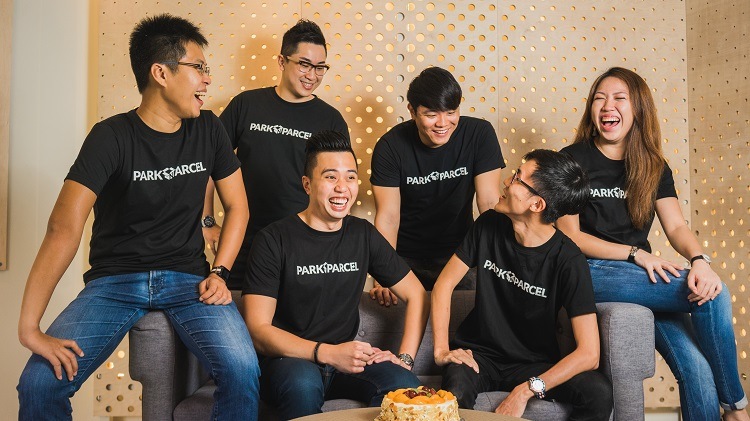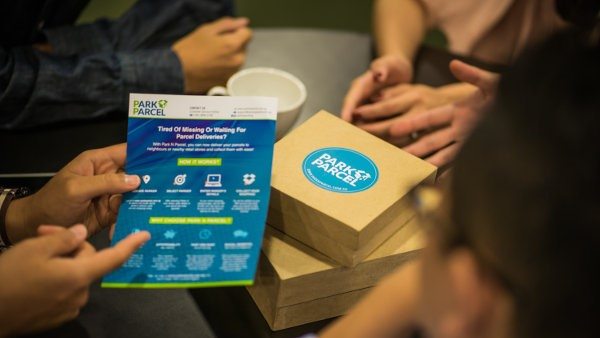Singaporean entrepreneurs tackle last-mile delivery with neighborhood spirit

The Park N Parcel team. Photo credit: Park N Parcel.
Online shopping is quickly turning into a favorite hobby for many people in Singapore these days – 73 percent of adult Singaporean internet users shopped online in 2016 and spent close to US$2.2 billion in online purchases according to a study by PayPal. Several startups that deal with logistics and package delivery have jumped on the opportunity.
Singapore’s Park N Parcel falls into the latter category and it’s going all sharing economy on the problem of missing your delivery.
In busy Singapore, people miss a ton of deliveries because they’re not at home when their package arrives. That’s how Bryan See Toh, co-founder and CEO of Park N Parcel, first came up with the idea for the startup. His fiancee, a flight attendant, had deliveries constantly diverted to her aunt’s place where she could pick them up whenever she was back home.
Together with co-founders and longtime co-workers Erik Cheong and Tan Gan Hong, he decided to give everyone an “aunt” who could pick up deliveries for them.
A parking spot for your parcel
Shoppers find available “parkers” (as Park N Parcel calls them) on the startup’s website, where they’re displayed after a multi-step vetting process. Once matched with a parker that’s closest to them, they can use their details as the shipping address on their online order. When the parker receives the item, the shopper is notified and can then go and pick it up.
The shopper pays an extra fee (around US$1.80) to get access to the service. Parkers get a cut of that fee for their participation, and a review system helps spot any parkers who aren’t helpful. Park N Parcel has received more than 6,000 applications from aspiring parkers across Singapore since starting out in January, but has only approved 1,200 of them, mostly in residential addresses.
Park N Parcel decided to give everyone an ‘aunt’ who could pick up deliveries for them.
Cheong estimates that on average, a parker receives 10 parcels per month. The actual number depends on their location – if a parker is located close to a hub, like a train station, they can receive up to a hundred parcels per month while others may receive only a few, he says.
The solution of drop-off locations for parcels isn’t new. Singaporean logistics startup Ninja Van, for example, has Ninja Collect – a service delivering items to either partner businesses that act as recipients for deliveries, or drop-off lockers. SingPost has its own lockers called POPStations, where people can pick up their parcels at their convenience.
Cheong feels Park N Parcel’s solution has a place in the market nonetheless. For one, it gives users a drop-off point no farther than 1 kilometer from where they are, while lockers tend to be around 2.5km away. The startup also believes this fosters a sense of community between people who live close by.
The team is now rolling out an additional service called Park N Deliver, which helps users send items from one point to another using on-demand drivers. The aim is to serve small businesses or individuals that sell online.
To gain more momentum, Park N Parcel is exploring partnerships with small and medium-sized logistics companies as well as ecommerce platforms.
The former face problems like no access to drop-off lockers, limited resources, and high costs of re-delivering parcels, according to Cheong. For the latter, an additional option for delivery doesn’t hurt their business. For example, the startup collaborated with online marketplace Carousell, whose sellers often meet buyers in person to hand them their items.
“We are all solving the same last-mile problem, but with a different approach,” Cheong says.

Park N Parcel picks “parkers” through a multi-step vetting process and trains them on handling packages. Photo credit: Park N Parcel.
Looking to Asia by way of Israel
Park N Parcel seeks to prove the concept in Singapore, hoping to expand the service to other countries as well. Potential candidates include Thailand and Japan.
It recently won first place in the Singapore branch of Start Jerusalem, a startup competition organized by Israeli embassies around the world. The winners get to travel to Jerusalem for five days to learn from prominent figures of the Israeli startup ecosystem.
The Singaporean arm of the competition was organized by the embassy of Israel in the city-state in collaboration with social entrepreneurship incubator ImpacTech, which has offices in Singapore, Thailand, and Japan. Park N Parcel beat five other startups to clinch the win.
“Park N Parcel demonstrated a practical and innovative solution for a problem that has always been time-consuming,” says ImpacTech co-founder Yoav Elgrichi. He adds that the startup has “a positive impact on society by providing additional income to an aging population that now can turn their homes into neighborhood parcel collection centers.”
The startup has raised a seed round from angel investors and NUS Enterprise, where it was incubated. The amount is undisclosed, but the round values Park N Parcel at US$2.2 million, says Cheong. He adds that the firm is currently in talks with an international logistics services company for investment and collaboration.
Cheong claims the company received an average of 80 parcels a day during its first quarter. He doesn’t disclose any revenue figures but says they have since seen a 400 percent growth on the number of parcels and a 330 percent growth on the number of users.
source: https://www.techinasia.com/profile/michael-tegos


